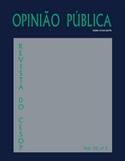Resumo
Nas últimas três décadas, programas de educação cívica tornaram-se recorrentes em várias partes do mundo. Tais programas possuem como princípio formulador o compromisso de imbuir nos envolvidos valores democráticos, desmistificar o mundo da política e fomentar o interesse sobre a atuação do Legislativo. Este artigo analisa o processo cognitivo de aprendizagem dos participantes do principal programa de educação cívica desenvolvido em Minas Gerais, o Parlamento Jovem (PJ), e também discorre sobre os motivos que levam programas de educação cívica como o PJ a obterem resultados opostos aos esperados. Além disso, apresenta os meandros da construção do conhecimento político nos participantes e o impacto do PJ. A análise parte de dados obtidos na pesquisa quase-experimental “O Parlamento Jovem como espaço de socialização política?”.
Abstract:
In the last three decades, civic education programs have become recurring in many parts of the world. Such programs have as principle formulator the commitment to instill democratic values, demystify the world of politics and foster interest in the work of the legislative. This article examines the cognitive process of learning of the participants of the main civic education program developed in Minas Gerais, the Parlamento Jovem (PJ). As also discusses the reasons why civic education programs such as the PJ to obtain opposite results than expected. Moreover, this paper presents the intricacies of the construction of political knowledge among the participants and the impact of the PJ. The analysis is based on data obtained in the quasiexperimental study “The young Parliament as locus of political socilaization?”.
Keywords: The Young Parliament; civic education; civic engagement; affect; policy cognition
Referências
ALMOND, G.; VERBA, S. The civic culture: political attitudes and democracy in five nations. Princeton: Princeton University Press, 1989.
CAROTHERS, T. “Democracy assistance: the question of strategy”. Democratization, vol. 4, nº 3, p. 109-132, 1997.
CONOVER, P.; FELDMAN, S. “How people organize the political world: a schematic model”. American Journal of Political Science, vol. 28, n° 1, p. 95-126, 1984.
COSSON, R. Escolas do legislativo, escolas de democracia. Brasília: Câmara dos Deputados, 2008.
DELLI CARPINI, M.; COOK, L.; JACOBS, L. “Public deliberation, discursive participation, and citizen engagement: A review of the empirical literature”. Annual Review of Political Science, vol. 7, p. 315-344, 2004.
FINKEL, S. “Can democracy be taught?” Journal of Democracy, vol. 14, nº4, p. 137-151, 2003.
FINKEL, S.; ERNST, H. “Civic education in post-apartheid South Africa: alternative paths to the development of political knowledge and democratic values”. Political Psychology, vol. 26, nº 3, p. 333-364, 2005.
FINKEL, S.; SABATINI, C.; BEVIS, G. “Civic education, civil society, and political mistrust in a developing democracy: the case of the Dominican Republic”. World Development, vol. 28, p. 1851-1874, 2000.
FINKEL, S.; SMITH, A. “Civic education, political discussion and the social transmission of democratic knowledge and values in a new democracy: the 2002 Kenya”. American Journal of Political Science, vol. 55, n° 2, p.417-435, 2011.
FUKS, M. “Efeitos diretos, indiretos e tardios: trajetórias da transmissão intergeracional da participação política”. Lua Nova, vol. 83, p. 145-178, 2010.
FUKS, M. “Atitudes, cognição e participação política: padrões de influência dos ambientes de socialização sobre o perfil político dos jovens”. Trabalho apresentado no IV Congresso Latino Americano de Opinião Pública da WAPOR. Belo Horizonte, 2011.
FUKS, M.; FIALHO, F. “Mudança institucional e atitudes políticas: a imagem pública da Assembleia Legislativa de Minas Gerais (1993-2006)”. Opinião Pública, vol. 15, nº1, p. 82-106, 2009.
JENKINS, K.; ANDOLINA, M.; KEETER, S.; ZUKIN, C. “Searching for the meaning of youth civic engagement: notes from the field”. Applied Developmental Science, vol. 6, n° 4, p. 189-195, 2002.
JENKINS, K.; ZUKIN, C.; ANDOLINA, M. Three core measures of community-based civic engagement: evidence from the youth civic engagement indicators project. In: Child Trends Conference on Indicators of Positive Development. Washington, DC; 1990.
JENNINGS, K.; NIEMI, R. “The transmission of political values from parent to child”. The American Political Science Review, vol. 62, n° 1, p.169-184, 1968.
KUKLINSKI, J.; LUSKIN, R. “Where the schema? Going beyond the “s” word in political psychology”. The American Political Science Review, vol. 85, n° 4, p.1341-1356, 1991.
KUKLINSKI, J.; QUIRK, P. Reconsidering the rational public: cognition, heuristics, and mass opinion. In: LUPIA, A.; MCCUBBINS, M. D.; POPKIN, S. L. (eds.). Elements of reason: cognition, choice, and the bounds of rationality. New York: Cambridge University Press, p. 153-82, 2000.
LODGE, M.; TABER, C. “The automaticity of affect for political leaders, groups, and issues: an experimental test of the hot cognition hypothesis”. Political Psychology, vol. 26, n° 3, p.455-482, 2005.
LUPIA, A.; MCCUBBINS, M. The democratic dilemma: Can citizens learn what they need to know? New York: Cambridge University Press, 1998.
LUPIA, A.; MCCUBBINS, M. The institutional foundations of political competence: how citizens learn what they need to know. In: LUPIA, A.; MCCUBBINS, M. D.; POPKIN, S. L. (eds.). Elements of reason: cognition, choice, and the bounds of rationality. New York: Cambridge University Press, p. 47-66, 2000.
MANGUE, D. “(In)formação, um caminho para a participação política? Um estudo de caso sobre o programa de educação para a cidadania da ALMG”. Belo Horizonte. p. 214. Dissertação de Mestrado em Ciência da Informação - Escola de Ciência da Informação, Universidade Federal de Minas Gerais, 2008.
PUTNAM, R. Comunidade e democracia: a experiência da Itália moderna. Rio de Janeiro: FGV, 1996.
SEARS, D.; VALENTINO, N. “Politics matters: political events as catalysts for preadult socialization”. The American Political Science Review, vol.91, n° 1, p. 45-65, 1997.
SLOMZYNSKI, K.; SHABAD, G. “Can support for democracy and the market be learned in school? A natural experiment in postcommunist Poland”. Political Psychology, vol. 19, n° 4, 1998.
TEDIN, K. “The influence of parents on the political attitudes of adolescents”. The American Political Science Review, vol. 68, n°. 4, p.1579-1592, 1974.
VERBA, S.; BURNS, N.; SCHLOZMAN, K. “Knowing and caring about politics: gender and political engagement”. The Journal of Politics, vol. 59, n° 4, p. 1051-1072, 1997.
A Opinião Pública utiliza a licença do Creative Commons (CC), preservando assim, a integridade dos artigos em ambiente de acesso aberto.

